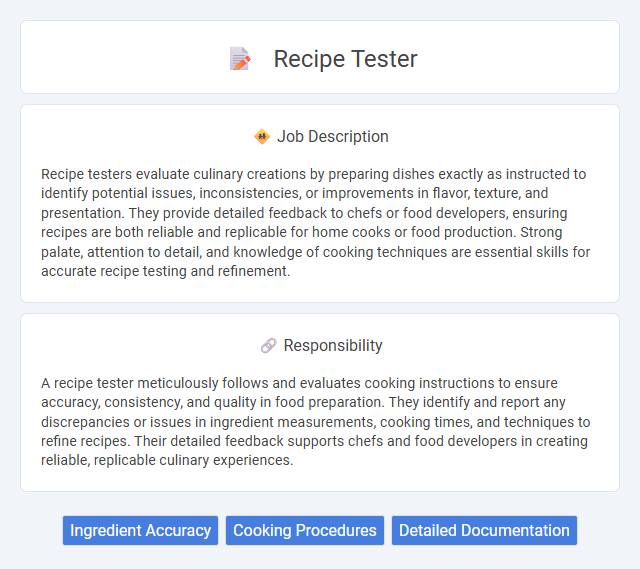
Recipe testers evaluate culinary creations by preparing dishes exactly as instructed to identify potential issues, inconsistencies, or improvements in flavor, texture, and presentation. They provide detailed feedback to chefs or food developers, ensuring recipes are both reliable and replicable for home cooks or food production. Strong palate, attention to detail, and knowledge of cooking techniques are essential skills for accurate recipe testing and refinement.
People who have a passion for food and strong attention to detail are likely suitable for a recipe tester job. Those with good sensory skills, such as taste and smell, and the ability to provide constructive feedback may excel in this role. Individuals who are open to trying new ingredients and variations might also find this job rewarding and well-suited to their interests.
Qualification
Recipe tester jobs require strong culinary skills and attention to detail to accurately assess flavor, texture, and presentation. Candidates should possess experience in food preparation, knowledge of cooking techniques, and the ability to follow and refine recipes precisely. Familiarity with food safety standards and strong communication skills for providing detailed feedback are essential qualifications.
Responsibility
A recipe tester meticulously follows and evaluates cooking instructions to ensure accuracy, consistency, and quality in food preparation. They identify and report any discrepancies or issues in ingredient measurements, cooking times, and techniques to refine recipes. Their detailed feedback supports chefs and food developers in creating reliable, replicable culinary experiences.
Benefit
Recipe tester jobs probably offer valuable hands-on experience that enhances culinary skills and expands knowledge of ingredient interactions. They may provide opportunities for creativity and innovation in recipe development, which can be rewarding for food enthusiasts. This role likely supports career growth in the food industry by allowing testers to refine their palate and gain insights into food science.
Challenge
Recipe tester jobs often present the challenge of accurately replicating recipes while accounting for ingredient variability and kitchen equipment differences. The role may require adjusting techniques and measurements probabilistically to ensure consistent results across diverse conditions. Successfully managing these uncertainties is crucial for refining recipes that appeal to a wide audience.
Career Advancement
A recipe tester job offers valuable hands-on experience in culinary development, enabling skill enhancement in flavor profiling, ingredient substitution, and cooking techniques. Professionals in this role often advance to positions such as food stylist, product developer, or quality assurance specialist within food companies, enhancing their expertise in food science and consumer preferences. Continuous learning and collaboration with chefs and nutritionists accelerate career growth opportunities in the competitive food industry.
Key Terms
Ingredient Accuracy
Recipe testers ensure ingredient accuracy by meticulously measuring and verifying each component to guarantee recipe consistency and flavor balance. They assess substitutions and regional variations in ingredients to maintain the intended taste and texture. Accurate ingredient handling helps prevent cooking errors and supports the development of reliable, repeatable recipes.
Cooking Procedures
Recipe testers meticulously follow detailed cooking procedures to ensure accuracy and consistency in culinary results. They measure ingredients precisely, monitor cooking times, and adjust temperatures according to recipe specifications. Their critical evaluation of each step helps refine techniques and improve final dish quality before publication.
Detailed Documentation
Recipe tester jobs require meticulous attention to detail in documenting ingredient quantities, cooking times, and preparation steps to ensure recipe accuracy and reproducibility. Detailed documentation helps identify inconsistencies, flavor balance, and texture, enabling precise adjustments for improved outcomes. Maintaining comprehensive records supports collaboration with chefs and publishers, enhancing recipe quality and user satisfaction.
 kuljobs.com
kuljobs.com